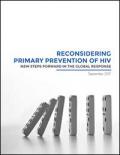Publications - Released in 2017
Propelled by the introduction of powerful and life-saving antiretroviral medications, the increasingly bio-medicalized global HIV response challenges us to rigorously reimagine prevention. While this is a welcome development in the global response to HIV, access to medical interventions is hampered by the costs of medicines, healthcare, testing and monitoring, and the politics of funding. In addition, gay and bisexual men, people who use drugs, sex workers, and transgender people are not prioritized for antiretroviral treatment or are offered only a limited number of places in treatment programs because these groups are not seen as deserving. Moralistic decision-making about who should have access to treatment is common (e.g., the requirement of absolute abstinence from drug use as a condition for services).
While access to antiretroviral medication used prophylactically or as treatment for HIV is an urgently needed human right, primary prevention should be conceptualized more broadly than expanded coverage of antiretroviral medications.






